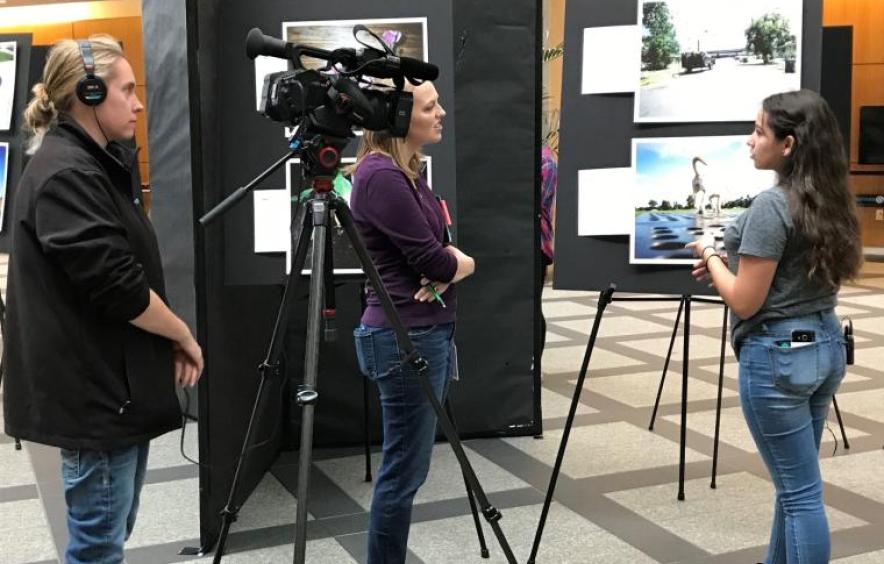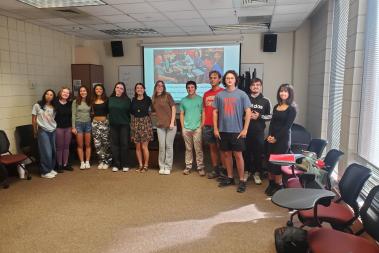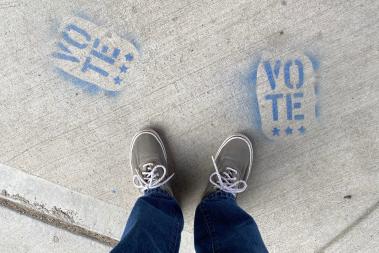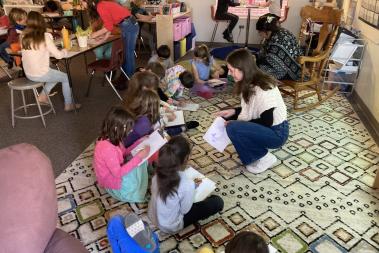Funding for Community-Engaged Learning
Community-engaged methods differ from approaches that emphasize one-way applications of academic expertise to community problems. Community engagement is a method, a strategic approach to teaching, scholarship (research, creative work) and service to address public problems through collaborative community partnerships, where community partners are involved in courses that:
- Are reciprocal, mutually beneficial
- Share risk, benefit, responsibility
- Can be local, national, and/or global
- With diverse entities (e.g., non-profit, government, private sector)
On this page:
Funding for Community-Engaged Learning
CCESL offers Community-Engaged Learning (CEL) funding to support instructors to enhance student learning through community-based projects. Applicants can request funds from multiple funding categories such as:
Community-engaged class projects
Development of community-engaged courses
Institutional capacity building (e.g., bringing together instructors who teach similar courses to develop collaborative ideas for community-engaged activities)
Community-Engaged Student Assistants
Professional development (e.g., scholarship of teaching and learning for community-engaged teaching)
Appointed faculty, adjunct faculty, postdoctoral and graduate student instructors may apply. Visit our Public Impact Blog to view more stories of community engagement.
Resource to aid in community-engaged teaching: Community-Engaged Learning Syllabus Rubric
Review application details and questions in advance here to help you prepare: CCESL CE Funding 2025-2026 App Questions.pdf
Community-Engaged Learning FAQs
-
Project Eligibility
The Community-Engaged Learning (CEL) funding supports projects with 1) robust DU student involvement or professional development, and 2) strong potential to impact DU student learning. Applications need to demonstrate robust student involvement, potential impact on DU student learning, and DU course development and/or professional development or institutional capacity-building for CEL that benefits the DU community.
For class projects, CEL funds are meant to support class projects in which student contributions address a community partner’s identified goal or need, ensuring a mutual benefit to both the community partner and student learning. Through reciprocal partnerships, CEL often employs learning by doing and reflecting in which student activities meet both the identified community need/goal and at least one course learning objective.
Successful CEL applications need to demonstrate:
robust student involvement
potential impact on DU student learning and DU course development, and/or
professional development or institutional capacity-building for CEL that benefits the DU community.
For class projects, CEL funds are meant to support class projects in which student contributions address:
a community partner’s identified goal or need
at least one course learning objective
These components ensure reciprocity and a mutual benefit to both the community partner and student learning. Funding category details are below.
-
Faculty Eligibility
This funding mechanism is designed to support instructors at any stage in their community-engaged teaching journey, from beginners who are developing their very first community-engaged course to experienced practitioners teaching a well-established community-engaged course. Appointed faculty, adjunct faculty, postdoctoral, and graduate student instructors may apply.
For faculty who have received previous CCESL funding for projects past their end date, the final report must be submitted and any remaining funds returned to CCESL before being eligible for future funding. Your report can be submitted here. Faculty with a currently funded project (e.g. not past its end date) may be eligible, please reach out to ccesl@du.edu to discuss your needs.
-
Funding Categories & Amounts
CCESL uses a single, universal application for multiple funding categories. Applicants may request funds from multiple funding categories listed below. Requests for funds that fall outside of these categories will not be granted.
Funding Category
Description (goals, funds available, example eligible costs)
Class Projects
Goals:
Implement specific community-engaged learning projects (e.g., supplies needed to implement projects).
Funds up to $3,000:
Examples of eligible costs: course activity costs such as transportation to community sites, honoraria for community partners, and materials and supplies.
Professional Development
Goals:
Disseminate information (presentations, articles, reports) regarding community-engaged courses or projects focused on student learning (e.g., scholarship of teaching and learning); and/or
Significant professional development opportunity (not otherwise available at DU) related to community-engaged teaching that can also benefit colleagues’ development. Specifically, there must be evidence that the faculty will share their learning with others on campus, such as through CCESL’s Public Impact newsletter or a CCESL-sponsored presentation.
Funds up to $1,500:
Examples of eligible costs: Conference travel to present on community-engaged scholarship of teaching and learning and/or seeking out training to advance community-engaged curriculum that is not available at DU. Funds may generally be used for conference registration, transportation, housing, and meals. Applicants should make clear why other conference travel sources, such as those available through departments, cannot be used.
Relationship Building and Course Development
Goals:
Develop new community-engaged learning opportunities (e.g., costs that are essential to new course development, not covered under other CCESL programs, and for which support is not available elsewhere);
Deepen existing community-engaged learning opportunities or partnerships.
Funds up to $500:
Examples of eligible costs: Costs associated with relationship building with partners such as honoraria or meals. Requests may also include faculty stipends up to $75/hour unless the faculty member has received other CCESL stipend funds for course development such as through the Community-Engaged Teaching 101 Workshop.
Note: funding requests involving honoraria for guest speakers to class need to demonstrate how such funds contribute to the development of partnerships for community-engaged learning
Institutional Capacity-Building
Goals:
Provide community-engaged professional development opportunities for a group of DU instructors who have experience teaching community-engaged courses; and/or
Create a community of instructors interested in developing a departmental and/or inter-departmental community-engaged plan.
Funds up to $2000:
Examples of eligible costs: Costs associated with speakers/trainers/facilitators, materials such as books or other supplies; meeting logistics such as rooms and refreshments; Faculty stipends (up to $75/hour, not to be used in combination with other CCESL funds, such as Public Good Grants); other materials and supplies to support the development of community-engaged instructor communities or similar capacity building community-engaged learning opportunities/events.
Community Engagement Student Assistant(s)
Goals:
Provide support to DU faculty members for community-engaged teaching, research, and/or creative work. Only research or creative work that has robust student involvement is eligible (e.g., research where students are members of a collaborative research team). These positions must support faculty in ways that directly benefit the DU student experience.
Funding varies, however amounts in line with other funding categories have higher approval chances:
Typically, assistants work 5-10 hours weekly, but this may vary based on faculty requirements. In your application, indicate your total budget. When determining hourly wages, faculty should consider the duties expected and consult the Student Employment Guidelines.
If helpful, you can calculate the total amount of your request as follows:
# of hours/quarter X # of quarters served = total hours
Total hours X hourly wage = total wage
Total wage X .017 (student fringe rate for FY, confirm the amount here) = total fringe
TOTAL BUDGET REQUEST = total wage + total fringe
Assistant roles can encompass:
Conducting relevant background research;
Facilitating partnership development with community organizations;
Planning and executing teaching or research tasks;
Devising reflection tools or guiding reflection activities;
Contributing to project assessment, partnership evaluation, and student learning analysis;
Liaising with stakeholders and community partners;
Sharing community-engaged narratives via social media or public channels;
Problem-solving with students, partners, and faculty.
Each Faculty-Student Assistant team will create their own plan for how the Student Assistant will support the community-engaged work. Both undergraduate and graduate students are eligible. Participation also offers access to the CCESL Student Scholars program, providing mentorship, professional development, and reflective assistance.
-
Policies Regarding Expenses
Grants cover faculty expenses beyond normal departmental support; they are not intended to relieve departmental budgets or to relieve the budgets of community partners.
Non-fundable Expenses:
Computers;
Routine office expenses;
Expenses that have already been incurred;
Student tuition or compensation of students for academic, credit-bearing service.
Funding & Institutional Policies
Any use of Community-Engaged Learning Funds must be in accordance with institutional policies as detailed at https://www.du.edu/policy/find-policy. For example (but not limited to): research involving human or animal subjects must be reviewed by the DU Institutional Review Board; international travel must be registered with the university in advance; driving using institutional funds must comply with university driving procedures; following the Technology Acquisition policy for purchase of software and hardware.
-
Funding Timeline & Extension Requests
Award notifications are usually made within 2 weeks of application submission. For planning purposes, a start date 4-6 weeks after an application is submitted is recommended.
Funds must ordinarily be spent within 1 month of the proposed end date. If additional time is needed beyond the proposed end date, a request for extension must be submitted in writing. A written request must be submitted to ccesl@du.edu that includes the dollar amount remaining, the reason for the extension, and a new end date.
-
Expectations if Funded
Reporting Impacts
Recipients are expected to work with CCESL to disseminate information about your project, including submitting a short final report form, which will ask you to include a (300-500 words) article on the project for publication in our Public Good Impact Newsletter. This article is due within 30 days of the project’s end date, as indicated on your application. You may invite your community collaborators and/or students to work with you on this article. We hope that this short article will help translate the impact of your work campus-wide. Please plan to include any relevant photos, collateral, or other products you’d like to share. Please submit your report here.
Recognition
In communications about this project (e.g., posters, talks, manuscripts), please include recognition that the work is funded by CCESL. For talks and posters, we you can access copies of these logos for your use here (for questions, please email ccesl@du.edu).
Community-Engaged Faculty Community
You will be invited to join the “CE Faculty Community” group on Teams. The Teams group is a place for CCESL to share updates and for faculty to get and give advice and support.
-
Submission Deadline & Application Process
Applications are reviewed on a rolling basis. Please expect at least 2 weeks for your application to be reviewed. The selection committee bases its selection on the quality of the proposal, including the budget request and narrative, as well as with consideration of supporting community engagement across the university.
After submitting the online application form, an automated confirmation email, including a copy of your application, will be sent to you. If you do not receive this confirmation within 2 business days, please contact ccesl@du.edu.
Please submit your application via this online application. You can view the application questions in advance HERE.
-
Additional Support & Questions
Professional Development: Each year CCESL offers professional development opportunities, both for new and continuing community-engaged practitioners. To learn more about Community-Engaged Teaching 101 or other professional development opportunities, visit our website here.
Consultations: CCESL’s Community Engagement Luminaries, a vibrant network of experienced faculty and community leaders who have experience in campus-community partnerships, are available for consultations and syllabi review. Learn more about the program and get connected to a Luminary here. CCESL staff are also available to provide consultation and support in the development of community-engaged projects.
Scholar Shop: Scholar Shop is a platform that connects community organizations with DU students and faculty to collaborate on projects that address community-identified interests/issues. If you are looking to connect with prospective community partners, Scholar Shop may have a connection for you. Each Scholar Shop project is unique, based on the research question/project first proposed by a community organization then further explored/refined with faculty and/or student partner(s).
Please contact CCESL Associate Director John Macikas (John.Macikas@du.edu) with any questions.
The application is open for the 2025-2026 academic year. Applications are accepted on a rolling basis.
Apply NowI wanted to give students a resource for enacting radical democracy from within admittedly less than democratic institutions. The result was a sustained engagement with voter registration and education in combination with theoretical readings and discussions about the limits and possibilities of democracy...After participating in voter registration and education, nearly everyone in the class said that they will commit to being more actively engaged in democracy, including at minimum paying much more attention to elections and political news. Community-Engaged Learning grant recipient

Signature Faculty & Students Program
The DU Signature Faculty and Student Program recognizes faculty with records of excellence in mentoring undergraduate signature work in order to support their capacity to mentor collaborative, community-engaged signature work that addresses DU Grand Challenges issue areas.
Adding the Community-Engaged Attribute to Your Course
Did you know that you can add a “community-engaged” attribute to your courses that will appear in the Class Schedule? Tagging your course with the attribute helps:
- CCESL in tracking (and advocating for) the breadth of engaged class on campus
- Students in planning (they can even do a search for engaged classes specifically), and
- You gain attention for your work and we can recognize your contributions!
Demonstrating Community Engagement
Have you received funding, attended a training, participated in programming, or otherwise been connected with CCESL? We encourage you to indicate your affiliation with CCESL when you update your faculty materials in Watermark Faculty Success (formerly Activity Insite). Including this connection not only showcases your engagement and professional development but also demonstrates the broader impact of your work through CCESL’s support.
Learn HowPast Funded Work
Learn about some of the research and scholarship work funded by Community-Engaged Teaching Funding, previously known as Community-Engaged Learning Mini Grants.






Contact
Cara DiEnno, Executive Director
Note: CCESL programs, including this one, undergo an antiracist, anti-oppression review at least annually. In 2020, the review process led to revision of the program description and application materials; changes in the composition of review committee to include 1-2 community members; the addition of training for grant reviewers as well as information sessions for potential applicants.
